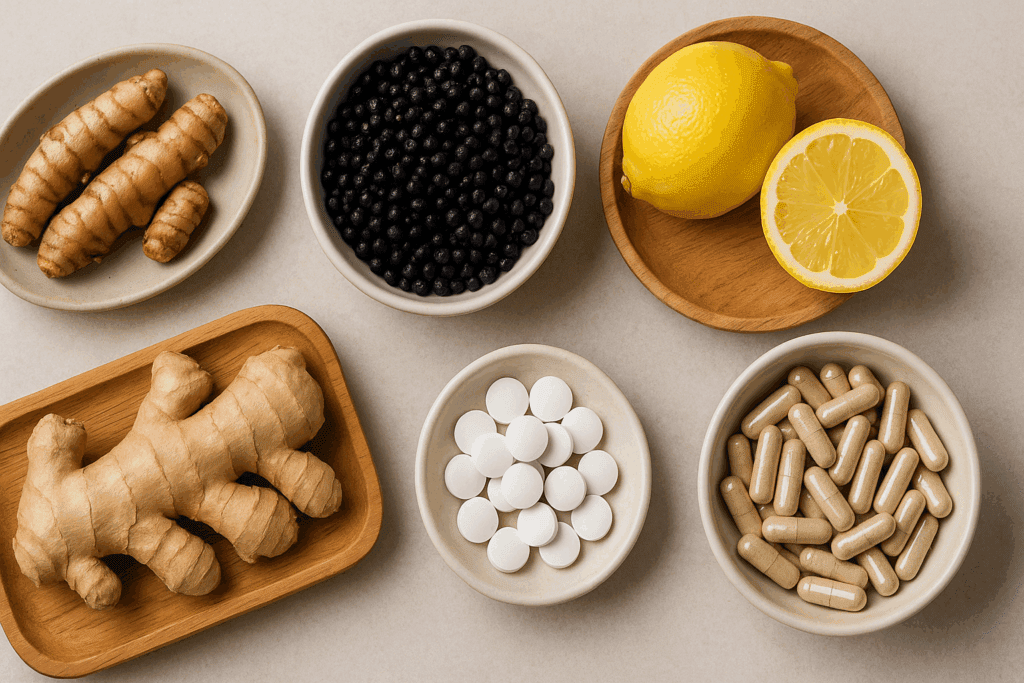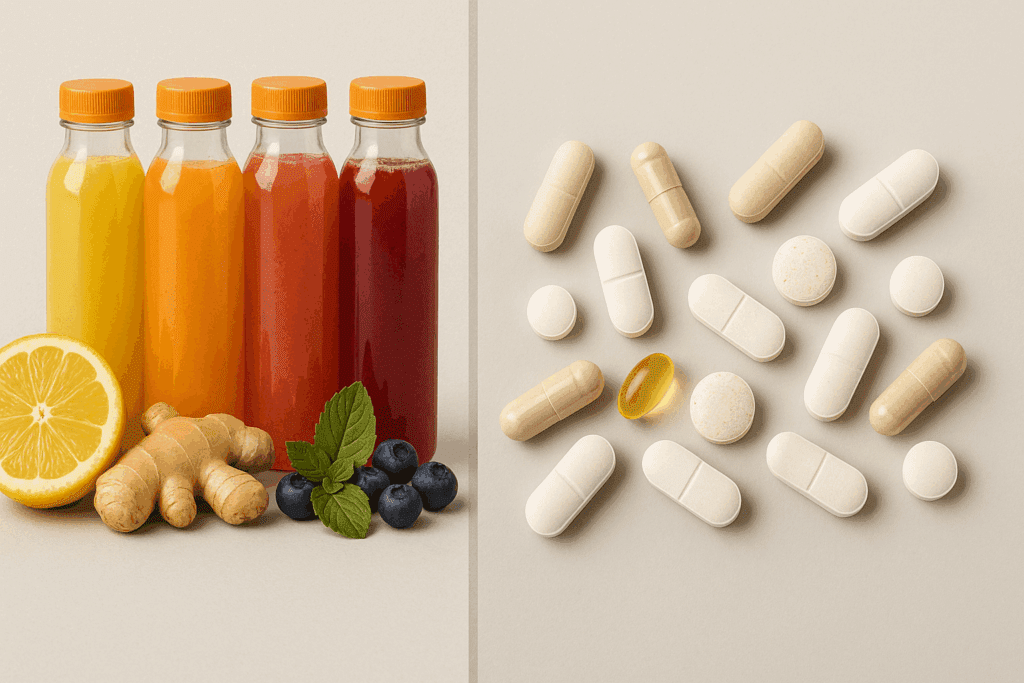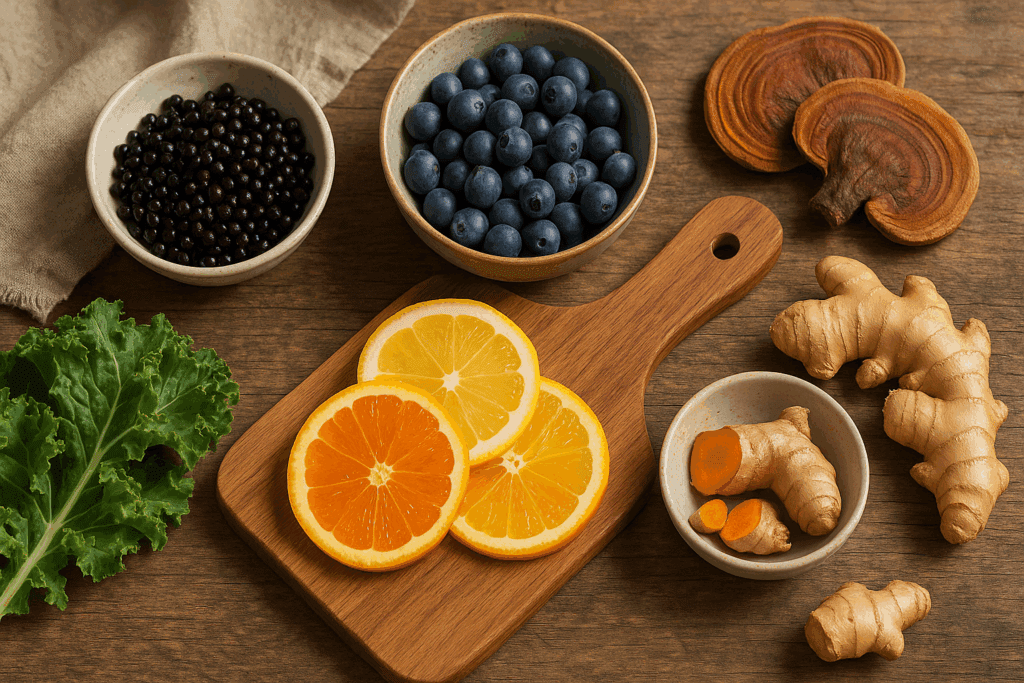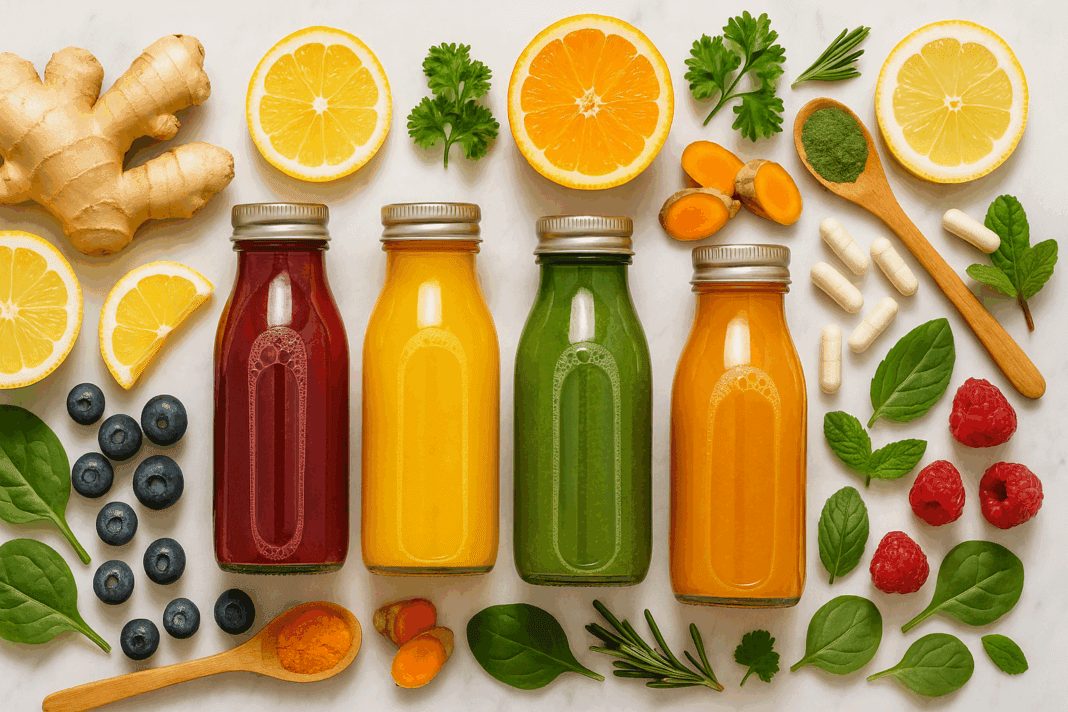Introduction: Why Immune Drinks Matter for Modern Wellness
In a fast-paced world where stress, pollution, lack of sleep, and processed foods have become everyday norms, maintaining a resilient immune system is more important than ever. One of the most accessible and practical tools emerging in the wellness space is the rise of immune drinks. These beverages, packed with vitamins, antioxidants, adaptogens, and probiotics, offer a proactive way to support immune function while also enhancing overall well-being. As more individuals turn to holistic health strategies to prevent illness rather than merely treat it, immune drinks are gaining popularity for their dual role in hydration and immunity support. Whether consumed as part of a morning ritual or incorporated into a post-workout routine, these functional beverages promise more than just refreshment—they are crafted to fortify the body from within. But as their popularity grows, so too does the confusion around which ones truly deliver results. This guide offers an in-depth look at what makes immune drinks effective, how to choose them wisely, and what science reveals about their role in everyday health.
You may also like: The Ultimate Guide to Choosing an Effective Immune Support Supplement for Daily Wellness

Understanding the Immune System and Nutritional Support
Before delving into the qualities of an effective immunity booster drink, it’s essential to understand how the immune system works and why certain nutrients are critical to its performance. The immune system is a complex network of cells, tissues, and organs that work together to defend the body against pathogens. It includes innate immunity, which provides immediate defense, and adaptive immunity, which learns and remembers specific threats. For this system to function optimally, it requires consistent nutritional support. Nutrients such as vitamin C, vitamin D, zinc, selenium, and iron are fundamental to immune cell function, antioxidant defense, and inflammation control. Furthermore, emerging research highlights the significance of gut health in immunity, pointing to the gut microbiome as a key modulator of immune response. What we consume directly influences this delicate balance. Therefore, choosing immune drinks fortified with these nutrients can significantly enhance the body’s resilience against infections and environmental stressors.

The Core Ingredients That Make Immune Drinks Effective
A truly effective immune drink isn’t just a flavored beverage with a health halo—it is a carefully crafted formulation that combines science-backed ingredients in bioavailable forms. Vitamin C, perhaps the most well-known immunity nutrient, is a staple in many immune drinks due to its ability to support various cellular functions and protect against oxidative stress. Vitamin D plays an equally vital role, particularly in modulating immune responses and reducing the risk of respiratory infections. Zinc is indispensable for the normal development and function of immune cells, while selenium acts as a cofactor for antioxidant enzymes. Probiotics, particularly strains like Lactobacillus and Bifidobacterium, have shown promise in enhancing gut health, which in turn supports immune balance. Additionally, botanicals like elderberry, echinacea, turmeric, and ginger are frequently included for their anti-inflammatory and antimicrobial properties. When selecting an immunity booster drink, it’s essential to consider not only the presence of these ingredients but also their dosage and synergy.

Immune Drinks vs. Traditional Supplements: What’s the Difference?
While traditional supplements like capsules and tablets have long dominated the market, immune drinks offer a distinct and often superior mode of delivery. One of the key advantages is bioavailability—liquid forms tend to be absorbed more efficiently and quickly by the body. This means that the nutrients in immune drinks may be utilized more effectively, especially when consumed on an empty stomach or alongside meals that aid absorption. Additionally, immune drinks often include hydrating electrolytes and adaptogens, providing multifunctional benefits beyond immune support. For individuals with digestive issues or pill fatigue, these beverages present a more palatable and convenient alternative. However, not all immune drinks are created equal. Some may contain excessive sugars or synthetic additives that diminish their health benefits. Therefore, evaluating ingredient quality and overall formulation remains critical when choosing between drinkable and pill-based immunity support.
Choosing the Best Immune Drinks for Your Needs
When faced with a wide array of options in the wellness aisle, selecting the right immune drink can feel overwhelming. The first step is to identify your specific health goals. Are you looking to prevent seasonal illnesses, reduce inflammation, support gut health, or boost energy levels? Your primary objective will guide your choice of ingredients. For instance, someone focused on gut health might prioritize a beverage with live probiotics and prebiotic fibers, while those targeting inflammation may look for turmeric and ginger-based blends. The next consideration is the ingredient list—opt for products that use natural, organic components and avoid artificial sweeteners, preservatives, and excessive caffeine. Transparency from the manufacturer regarding sourcing and third-party testing can further ensure product quality. Taste is another factor often overlooked but vital for adherence. A highly nutritious drink won’t do much good if it’s too unpleasant to consume regularly. Choose flavors you enjoy, and consider mixing with other beverages if necessary to enhance palatability without compromising nutrition.
Morning Drink to Boost Immune System: Building a Daily Ritual
Establishing a consistent morning routine that includes a morning drink to boost immune system function can set a positive tone for the entire day. Morning is a particularly effective time to support immune health because it aligns with natural cortisol rhythms and the body’s peak nutrient absorption period. A well-crafted morning immune drink can combine hydration, vitamins, minerals, and herbal adaptogens to energize the body while priming the immune system. Warm lemon water with ginger and turmeric offers anti-inflammatory and digestive benefits, while green tea provides antioxidants and mild caffeine to increase alertness. Some prefer smoothies fortified with elderberry syrup, leafy greens, and plant-based protein to provide comprehensive support. Others opt for packaged immune shots with concentrated doses of vitamin C, zinc, and probiotics. What matters most is consistency—by turning your immune drink into a morning habit, you create a foundation for long-term wellness and resilience.
Understanding the Science Behind Immunity Booster Drink Formulations
To evaluate an immunity booster drink effectively, it helps to understand the scientific rationale behind its formulation. Synergistic combinations of ingredients are a hallmark of well-designed products. For example, vitamin C enhances iron absorption, while vitamin D works in concert with calcium and magnesium to regulate immune cell signaling. The inclusion of bioenhancers like black pepper extract (piperine) can significantly increase the absorption of curcumin, the active compound in turmeric. Fermented ingredients and liposomal encapsulation are other strategies used to enhance nutrient delivery and stability. Scientific studies have demonstrated that regular consumption of drinks containing these enhanced formulations can lead to measurable improvements in immune biomarkers, such as increased levels of immunoglobulins and reduced inflammatory cytokines. However, it’s important to distinguish between clinical doses used in research and the often lower amounts found in consumer products. Consumers should look for transparency in labeling and clinical evidence supporting product claims when selecting immune drinks.

Spotlight on Superfoods: Key Players in Immune Drinks
Superfoods have become synonymous with functional nutrition, and many of them are prominently featured in today’s best immune drinks. Berries, particularly elderberries and blueberries, are rich in anthocyanins and flavonoids that exhibit potent antioxidant and antiviral properties. Citrus fruits contribute vitamin C and hesperidin, a polyphenol that supports endothelial function. Turmeric and ginger, both ancient staples in traditional medicine, are renowned for their anti-inflammatory and antimicrobial effects. Green leafy vegetables, such as spinach and kale, provide folate and chlorophyll that contribute to immune regulation and detoxification. Mushrooms like reishi, chaga, and maitake bring beta-glucans and polysaccharides that modulate immune cell activity. These ingredients are not only powerful in isolation but can also have additive or synergistic effects when combined. The presence of these superfoods in immune drinks enhances their appeal, offering a natural and flavorful path to immune support.
Common Pitfalls When Choosing Immune Drinks
Despite the promise of immune drinks, not all products deliver on their health claims. One common pitfall is excessive sugar content, which can counteract immune benefits by promoting inflammation and insulin resistance. Some brands use fruit juices or syrups to mask unpleasant flavors, resulting in beverages with more sugar than a soda. Another issue is the presence of synthetic additives, including artificial colors, flavors, and preservatives that may burden detoxification pathways. Additionally, vague labeling practices such as “proprietary blends” can obscure the exact amount of active ingredients, making it difficult to assess efficacy. Overreliance on trendy ingredients without adequate dosing is another red flag. Just because a product contains turmeric or elderberry doesn’t mean it’s present in therapeutic quantities. Consumers should approach product marketing critically and prioritize transparency, clinical backing, and quality sourcing when making purchasing decisions.

The Role of Gut Health in Immune Resilience
The link between gut health and immune function is well established, with nearly 70% of the immune system residing in the gut-associated lymphoid tissue (GALT). This close relationship underscores the importance of immune drinks that include probiotics, prebiotics, or fermented ingredients. Probiotics help balance gut flora, reduce intestinal inflammation, and improve the gut barrier function, thereby enhancing overall immune defense. Prebiotic fibers, such as inulin and fructooligosaccharides, serve as fuel for beneficial bacteria, encouraging their growth and activity. Some immune drinks incorporate kombucha, kefir, or other fermented components that offer a spectrum of bioactive compounds, including organic acids and enzymes. These elements not only improve digestion but also stimulate mucosal immunity and systemic immune signaling. Incorporating gut-supportive ingredients into immune drinks creates a comprehensive strategy for building resilience against infections and chronic inflammation.
Functional Beverages in a Busy Lifestyle: Practical Tips for Integration
In today’s on-the-go culture, convenience often dictates health choices. Fortunately, immune drinks can be seamlessly integrated into even the busiest of schedules. Ready-to-drink shots, shelf-stable powders, and concentrated tinctures allow for quick consumption with minimal preparation. Individuals can keep a stock of single-serve packets in their bags or desks, ensuring consistent use regardless of location. Morning routines can be enhanced with a warm cup of immune tea or a smoothie enriched with powdered superfoods. Post-exercise periods are another ideal window, as the body is primed to absorb nutrients and recover from physical stress. Some individuals choose to batch-prep their immune beverages for the week, storing them in reusable bottles for easy grab-and-go access. By aligning these drinks with existing habits—such as breakfast, workouts, or work breaks—individuals can enhance adherence and maximize the benefits of daily immune support.
Spotting Quality: What to Look for on the Label
Navigating the wellness aisle requires a discerning eye, particularly when it comes to reading product labels. The most trustworthy immune drinks will clearly state the quantity and form of each active ingredient, ideally accompanied by information on the source and manufacturing process. Look for third-party testing or certifications from independent organizations that verify purity, potency, and absence of contaminants. Organic and non-GMO labels indicate cleaner sourcing, while vegan or allergen-free tags provide added assurance for those with dietary restrictions. Avoid vague marketing terms like “natural immune support” unless backed by a specific list of clinically validated ingredients. Pay attention to serving sizes and total daily values, ensuring that the product delivers meaningful amounts without exceeding safe upper limits. Ingredient transparency, combined with scientific backing and responsible sourcing, is the gold standard when evaluating an immunity booster drink.
Immune Drinks for Different Life Stages and Health Needs
As immune function evolves with age, so too should the strategies used to support it. Children may benefit from gentle formulations with reduced dosages and familiar flavors, such as fruit-based immune drinks fortified with vitamin C and zinc. Teenagers, facing the stress of academic and social pressures, might prefer smoothies with adaptogens like ashwagandha and maca for added resilience. Adults navigating work-life balance often choose beverages that combine immune support with energy boosters such as green tea extract or B vitamins. Older adults, who may experience declining immunity and nutrient absorption, require drinks rich in vitamin D, probiotics, and antioxidants that address both systemic inflammation and bone health. Those with chronic illnesses, autoimmune conditions, or allergies should consult healthcare professionals before starting any new supplement regimen, including immune drinks, to ensure compatibility and avoid interactions. Tailoring choices to individual life stages and health profiles is key to maximizing benefits and safety.
Frequently Asked Questions About Immune Drinks and Daily Wellness
What distinguishes cold-pressed immune drinks from traditional supplements?
Cold-pressed immune drinks offer a unique advantage by preserving the raw nutritional integrity of their ingredients. The absence of high-heat processing ensures that delicate compounds like vitamin C, polyphenols, and live enzymes remain intact, enhancing both their bioavailability and functional value. Unlike pills that rely on fillers and binding agents, cold-pressed drinks deliver nutrients in a highly absorbable, liquid form that begins digestion in the mouth. Moreover, these drinks often feature synergistic whole-food blends that may not exist in isolated supplement formats, allowing for a more comprehensive approach to immune support. Their vibrant flavors and hydrating properties make them a more enjoyable and sustainable choice for individuals who struggle with traditional supplement routines.
Are there any emerging trends in immunity booster drink development?
Yes, the landscape of the immunity booster drink market is rapidly evolving, with new trends focused on advanced personalization and ingredient innovation. Companies are now using artificial intelligence to develop tailored formulations based on individual microbiome profiles and genetic markers. Additionally, novel ingredients such as fermented adaptogens, marine phytoplankton, and heat-stable postbiotics are making their way into formulations to offer more targeted immune modulation. Another promising area is nanotechnology, which enhances the delivery of fat-soluble nutrients like curcumin and vitamin D through liposomal encapsulation. These trends reflect a broader shift from generic wellness products to scientifically optimized solutions for personalized immunity enhancement.
How can athletes benefit from incorporating immune drinks into their recovery routine?
Athletes often experience transient immune suppression after intense physical exertion, making them more vulnerable to infections. Integrating immune drinks into a post-exercise recovery protocol can mitigate this risk by replenishing critical nutrients lost during training. Ingredients like tart cherry juice, ginger, and electrolytes not only support immune function but also reduce oxidative stress and inflammation. Additionally, hydration from immune drinks helps maintain mucosal barriers in the respiratory tract, which are essential for first-line immune defense. Over time, consistent use can contribute to fewer sick days, better training consistency, and overall improved performance resilience.
How do seasonal changes affect the formulation and effectiveness of immune drinks?
Seasonal variations in temperature, daylight exposure, and pathogen prevalence often necessitate changes in immune drink formulation to remain effective year-round. In winter, when viral infections spike and sunlight is scarce, formulations may contain higher levels of vitamin D, zinc, and warming botanicals like echinacea or elderberry. During spring and summer, antioxidant-rich fruits such as acerola cherry and camu camu become more prominent due to their availability and cooling properties. Brands are increasingly adapting their seasonal offerings to reflect these cyclical needs, providing targeted solutions for specific times of year. Understanding these seasonal dynamics can help consumers make more informed choices about when and how to use different types of immune drinks.
What are the psychological benefits of a consistent morning drink to boost immune system function?
Starting the day with a morning drink to boost immune system health does more than prime the body—it reinforces positive behavioral conditioning and mental clarity. This small, purposeful act fosters a sense of control and self-care, which can reduce anxiety and enhance mood. When paired with mindful practices such as deep breathing or gratitude journaling, the ritual of consuming an immune drink becomes a psychological anchor for daily wellness. This consistency may also reduce decision fatigue, setting a productive tone that enhances motivation for other health-supportive behaviors throughout the day. Over time, these small but meaningful actions can have a cumulative impact on both mental and physical resilience.
Can immune drinks support those with autoimmune conditions, or are there risks involved?
While immune drinks offer general support for immune modulation, individuals with autoimmune conditions must approach them cautiously. Some ingredients like echinacea or astragalus can overstimulate immune pathways, potentially triggering flare-ups in susceptible individuals. However, other compounds—such as curcumin, omega-3s, and vitamin D—have shown immunoregulatory effects that may benefit autoimmune populations when used under medical guidance. It’s crucial to differentiate between immune stimulation and immune modulation; the latter supports balance rather than activation. Patients should consult healthcare professionals before introducing any new immunity booster drink into their routine to ensure it aligns with their unique clinical profile.
How do immune drinks interact with medications or medical treatments?
The potential for interactions between immune drinks and medications is an important yet often overlooked consideration. For instance, high doses of vitamin K can interfere with blood thinners, while grapefruit extract—commonly used in some drinks—can alter the metabolism of certain statins and antihypertensives. Herbal ingredients such as ginseng or ashwagandha may also affect thyroid medications or corticosteroids. These interactions highlight the importance of reviewing product labels carefully and consulting a pharmacist or physician when combining immune drinks with ongoing treatment regimens. While these beverages can be beneficial, their natural potency means they should be treated with the same respect as traditional pharmaceuticals when it comes to safety.
What role do immune drinks play in workplace wellness initiatives?
Companies investing in employee wellness programs are beginning to include immune drinks as part of their health-forward offerings. Stocking office refrigerators with functional beverages encourages hydration and proactive immunity, particularly during cold and flu season. Some organizations pair these drinks with wellness challenges, biometric screenings, or educational seminars to promote holistic health engagement. From a human resources perspective, providing access to immune drinks is a cost-effective measure that can reduce absenteeism, enhance focus, and signal a genuine investment in employee well-being. As workplace culture continues to prioritize mental and physical health, functional beverages are emerging as a practical and popular tool for supporting corporate wellness goals.
How does sustainability impact the immune drinks industry and consumer choice?
As consumers become more eco-conscious, sustainability is increasingly influencing how they choose and perceive immune drinks. Many brands are transitioning to biodegradable packaging, carbon-neutral production processes, and locally sourced ingredients to meet environmental demands. The use of regenerative agriculture to grow botanicals and superfoods also contributes to long-term ecological health, enhancing the moral and environmental value of the product. Conscious consumers are beginning to favor companies that demonstrate transparency about their supply chain and environmental impact. This ethical dimension adds another layer of depth to the purchase decision, allowing individuals to support both personal health and planetary wellness through the same product.
Innovative Ways to Customize Immune Drinks at Home
For those who prefer a DIY approach, creating personalized immune drinks at home allows for complete control over ingredients, potency, and taste. By blending fresh fruits like kiwi and pomegranate with herbs such as tulsi and moringa, individuals can craft targeted beverages tailored to specific health goals. Adding prebiotic fiber powders or functional mushrooms like lion’s mane introduces gut and brain support to the immunity mix. Fermenting ingredients or incorporating probiotic cultures can elevate the nutritional value and support microbiome diversity. This creative process not only fosters deeper engagement with health practices but also reduces reliance on commercial products, offering a sustainable and empowering way to maintain immunity throughout the year.
Conclusion: Harnessing the Power of Immune Drinks for Lifelong Wellness
The journey to sustained health and resilience is not defined by isolated actions but by daily choices that compound over time. Immune drinks, when selected thoughtfully and consumed consistently, can serve as one of these foundational pillars. They provide a convenient and enjoyable way to nourish the body, deliver essential nutrients, and support the intricate workings of the immune system. As science continues to uncover the relationships between diet, gut health, inflammation, and immune performance, functional beverages stand at the crossroads of tradition and innovation. Whether you start your day with a morning drink to boost immune system function or rely on an immunity booster drink during stressful periods, these liquid allies offer a pathway to proactive wellness. By understanding their ingredients, mechanisms, and applications across different life stages, you can make informed choices that align with your goals. In an era where well-being is both a personal responsibility and a collective pursuit, immune drinks empower us to take health into our own hands, one sip at a time.



